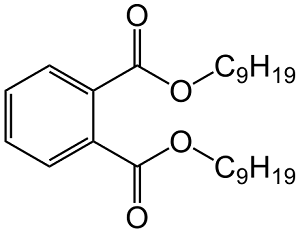Diisononyl Phthalate

Product Description
Diisononyl phthalate (DINP) is a chemical compound used as a plasticizer. DINP is typically a mixture of chemical compounds consisting of various isononyl esters of phthalic acid, and is commonly used in a large variety of plastic items.
Product:
Diisononyl Phthalate
CAS:
28553-12-0
Synonym:
1,2-Benzenedicarboxylic acid diisononyl ester
Structure:

Typical Characteristics
Appearance
Colorless Viscous Liquid
Boiling point
244 to 252 °C
Density
0.98 g/cm3
Flash Point
221 °C
Melting point
−43 °C
Molecular Weight
418.61
Odor
Slight ester odor
Purity
≥ 99 %
Refractive index
1.485
Uses, Applications & Markets
Key applications
get a quote
We Offer Diisononyl Phthalate
in various grades
A few of the grades available are listed below:



Diisononyl Phthalate used in many
industry applications
Diisononyl phthalate (DINP) is a chemical compound with various industrial applications. Here's a list of some of its uses:
- Plasticizers: DINP is primarily used as a plasticizer in the production of flexible polyvinyl chloride (PVC) products. It imparts flexibility, durability, and resilience to PVC materials, making them suitable for applications such as flooring, wall coverings, wire and cable insulation, automotive parts, and medical devices.
- Coatings and Sealants: It is used as a plasticizer and film-forming agent in coatings, sealants, and caulks. DINP helps improve the flexibility, adhesion, and weather resistance of coating formulations, allowing them to adhere well to substrates and withstand exposure to harsh environmental conditions.
- Adhesives and Binders: DINP is used as a plasticizer and tackifier in the formulation of adhesives, sealants, and binders. It helps improve adhesion, cohesion, and flexibility in adhesive formulations, making them suitable for bonding a variety of substrates, including wood, metal, plastics, and ceramics.
- Textile Auxiliaries: DINP is used in textile processing as a softening agent and lubricant for natural and synthetic fibers. It helps to improve fabric softness, hand feel, and dye uptake during the dyeing and finishing processes, resulting in textiles with enhanced comfort and appearance.
- Personal Care Products: It is used in the formulation of personal care products, including cosmetics, skincare products, and hair care products. DINP serves as a solvent, emollient, and viscosity regulator, helping to improve product texture, spreadability, and stability.
- Industrial Cleaners: DINP is used as a solvent and coupling agent in industrial cleaning formulations, such as degreasers, solvent cleaners, and metalworking fluids. It helps dissolve and remove oil, grease, and other contaminants from surfaces, facilitating cleaning and maintenance operations.
- Electronics Industry: DINP is used as a plasticizer and solvent in the production of electronic components, such as cables, wires, and circuit boards. It helps improve the flexibility and durability of plastic materials used in electronic devices, as well as facilitate the manufacturing process.
- Automotive Industry: DINP is used in the automotive industry for the production of interior and exterior components, such as dashboards, door panels, and trim pieces. It imparts flexibility, resilience, and durability to plastic materials, enhancing their performance and longevity in automotive applications.
- Medical Devices: DINP is used in the production of medical devices and equipment, such as blood bags, IV tubing, and surgical gloves. It provides flexibility and durability to PVC materials used in medical applications, ensuring compliance with regulatory standards and patient safety.
- Consumer Products: DINP is used in a variety of consumer products, including toys, footwear, and household items. It imparts flexibility and resilience to plastic materials, making them suitable for everyday use and ensuring product durability and longevity.